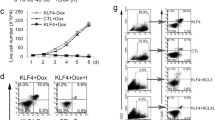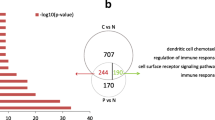Abstract
Background
T-cell acute lymphoblastic leukemia (T-ALL) is considered a malignant tumor with a high mortality rate. To combat this disease, exploring the mechanism of T-ALL progression is urgently needed. Krüppel-like factors (KLFs) are known as the transcription factors and mediate series of biological processes. KLF9 is a member of the KLF family which could serve as a tumor suppressor gene in most solid tumors. GEO Database analysis showed that KLF9 expression in normal T cells was higher than T-ALL cell lines and patients. However, the possible role of KLF9 in T-ALL progression is still unclear.
Objective
To uncover the possible effects of Krüppel-like transcription factor 9 (KLF9) on the progression of T-Acute lymphoblastic leukemia (T-ALL).
Results
The expression of KLF9 was low in human T-ALL cells. KLF9 suppressed the viability of T-ALL cells. In addition, KLF9 stimulated the apoptosis as well as autophagy of T-ALL cells. Mechanically, KLF9 suppressed AKT/mTOR pathway in T-ALL cells.
Conclusion
KLF9 suppressed viability and promoted autophagy as well as apoptosis in T-ALL cells by inhibiting AKT/mTOR pathway.





Similar content being viewed by others
Data availability
The authors declare that all data supporting the findings of this study are available within the paper and any raw data can be obtained from the corresponding author upon request.
References
Boekstegers AM et al (2017) MRD response in a refractory paediatric T-ALL patient through anti-programmed cell death 1 (PD-1) Ab treatment associated with induction of fatal GvHD. Bone Marrow Transpl 52:1221–1224
Carofino BL et al (2016) PRDM14 promotes RAG-dependent Notch1 driver mutations in mouse T-ALL. Biol Open 5:645–653
Chen L et al (2021) Genome-wide identification, evolution of Kruppel-like factors (klfs) and their expressions during GCRV challenge in grass carp (Ctenopharyngodonidella). Dev Comp Immunol 120:104062
Cui A et al (2019) Dexamethasone-induced Kruppel-like factor 9 expression promotes hepatic gluconeogenesis and hyperglycemia. J Clin Investig 129:2266–2278
Eaton SA et al (2008) A network of Kruppel-like Factors (Klfs). Klf8 is repressed by Klf3 and activated by Klf1 in vivo. J Biol Chem 283:26937–26947
Fahy L et al (2021) Hypoxia favors chemoresistance in T-ALL through an HIF1alpha-mediated mTORC1 inhibition loop. Blood Adv 5:513–526
Fan Y, Zeng F, Ma L, Zhang H (2021) Effects of beta-carboline alkaloids from Peganum harmala on the FAK/PI3K/AKT/Mtor pathway in human gastric cancer cell line SGC-7901 and tumor-bearing mice. Pak J Pharm Sci 34:891–898
Fang QY, Deng QF, Luo J, Zhou CC (2020) MiRNA-20a-5p accelerates the proliferation and invasion of non-small cell lung cancer by targeting and downregulating KLF9. Eur Rev Med Pharm Sci 24:2548–2556
Fogelstrand L et al (2014) Prognostic implications of mutations in NOTCH1 and FBXW7 in childhood T-ALL treated according to the NOPHO ALL-1992 and ALL-2000 protocols. Pediatr Blood Cancer 61:424–430
Haldar SM, Ibrahim OA, Jain MK (2007) Kruppel-like factors (KLFs) in muscle biology. J Mol Cell Cardiol 43:1–10
Han X et al (2019) MiR-889 promotes cell growth in human non-small cell lung cancer by regulating KLF9. Gene 699:94–101
Knoedler JR, Saenz de Miera C, Subramani A, Denver RJ (2021) An intact kruppel-like factor 9 gene is required for acute liver period 1 mRNA response to restraint stress. Endocrinol 162:bqab083. https://doi.org/10.1210/endocr/bqab083
Leong S et al (2020) CD1a is rarely expressed in pediatric or adult relapsed/refractory T-ALL: implications for immunotherapy. Blood Adv 4:4665–4668
Li Y et al (2019) KLF9 suppresses gastric cancer cell invasion and metastasis through transcriptional inhibition of MMP28. FASEB J: Off Publ Federation Am Soc Exp Biol 33:7915–7928
Mitchell DL, DiMario JX (2010) Bimodal, reciprocal regulation of fibroblast growth factor receptor 1 promoter activity by BTEB1/KLF9 during myogenesis. Mol Biol Cell 21:2780–2787
Shen P et al (2014) KLF9, a transcription factor induced in flutamide-caused cell apoptosis, inhibits AKT activation and suppresses tumor growth of prostate cancer cells. Prostate 74:946–958
Shen P et al (2021) KLF9 suppresses cell growth and induces apoptosis via the AR pathway in androgen-dependent prostate cancer cells. Biochem Biophys Rep 28:101151
Staffas A et al (2015) Wild-type KRAS inhibits oncogenic KRAS-induced T-ALL in mice. Leukemia 29:1032–1040
Wang Q et al (2016) Sam68 affects cell proliferation and apoptosis of human adult T-acute lymphoblastic leukemia cells via AKT/mTOR signal pathway. Leuk Res 46:1–9
Wang L, Mao Q, Zhou S, Ji X (2019) Hypermethylated KLF9 is an independent prognostic factor for favorable outcome in breast cancer. Onco Targets Ther 12:9915–9926
Wang X et al (2021) Melatonin promotes bone marrow mesenchymal stem cell osteogenic differentiation and prevents osteoporosis development through modulating circ_0003865 that sponges miR-3653-3p. Stem Cell Res Ther 12:150
Xu Q et al (2020) Knockdown of KLF9 promotes the differentiation of both intramuscular and subcutaneous preadipocytes in goat. Biosci Biotechnol Biochem 84:1594–1602
Yan Q et al (2019) KLF9 aggravates ischemic injury in cardiomyocytes through augmenting oxidative stress. Life Sci 233:116641
Yuan T et al (2022) Downregulation of FAPP2 gene induces cell autophagy and inhibits PI3K/AKT/mTOR pathway in T cell acute lymphoblastic leukemia. Hematol Oncol 40:249–257
Zhang QH et al (2015) Lentivirus-mediated knockdown of Kruppel-like factor 9 inhibits the growth of ovarian cancer. Arch Gynecol Obstet 291:377–382
Zhang Y et al (2019) Chemotherapy-induced cellular senescence suppresses progression of notch-driven T-ALL. PLoS One 14:e0224172
Zhang L et al (2020) miR-483-3p, mediated by KLF9, functions as tumor suppressor in testicular seminoma via targeting MMP9. Front Oncol 10:596574
Zhong Z et al (2018) Expression of KLF9 in pancreatic cancer and its effects on the invasion, migration, apoptosis, cell cycle distribution, and proliferation of pancreatic cancer cell lines. Oncol Rep 40:3852–3860
Acknowledgements
Not applicable.
Funding
Not applicable.
Author information
Authors and Affiliations
Contributions
JZ and WT designed the experiments. SH, CX and SZ carried them out. XC, XL and QY analyzed and interpreted the data, LY and LM prepared the manuscript with contributions from all co-authors.
Corresponding author
Ethics declarations
Conflict of interest
Author Jie Zhao declares that he/she has no conflict of interest; author Shaolong He declares that he/she has no conflict of interest; author Chenhuan Xiang declares that he/she has no conflict of interest; author Shaoli Zhang declares that he/she has no conflict of interest; author Xinyue Chen declares that he/she has no conflict of interest; author Xinyi Lu declares that he/she has no conflict of interest; author Qiong Yao declares that he/she has no conflict of interest; author Liping Yang declares that he/she has no conflict of interest; author Liangming Ma declares that he/she has no conflict of interest; author Weiwei Tian declares that he/she has no conflict of interest.
Ethical approval
This article does not contain any studies with human participants or animals performed by any of the authors.
Additional information
Publisher's Note
Springer Nature remains neutral with regard to jurisdictional claims in published maps and institutional affiliations.
Rights and permissions
Springer Nature or its licensor holds exclusive rights to this article under a publishing agreement with the author(s) or other rightsholder(s); author self-archiving of the accepted manuscript version of this article is solely governed by the terms of such publishing agreement and applicable law.
About this article
Cite this article
Zhao, J., He, S., Xiang, C. et al. KLF9 promotes autophagy and apoptosis in T-cell acute lymphoblastic leukemia cells by inhibiting AKT/mTOR signaling pathway. Mol. Cell. Toxicol. 19, 531–538 (2023). https://doi.org/10.1007/s13273-022-00284-4
Accepted:
Published:
Issue Date:
DOI: https://doi.org/10.1007/s13273-022-00284-4




